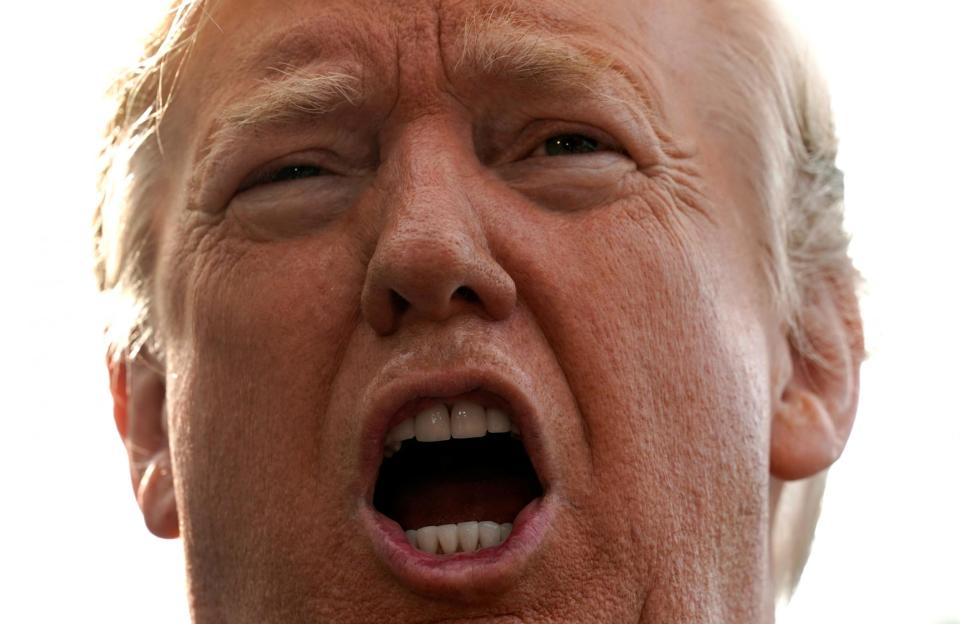As his latest moves with China prove, Donald Trump's tantrums are now hurting the groups he vowed to protect

Trump and tariffs. The words go together like Lennon and McCartney, bacon and eggs, toddler and tantrum.
Having just threatened to unveil a fresh round of levies on Chinese goods exported to the US, the president has once again unleashed havoc on global markets.
Stocks in Shanghai dropped to a two-year low, the yuan plummeted against the dollar, and Chinese analysts bemoaned the “darkest hour” for markets.
So far, so standard fare for the American leader, who can’t have expected anything less when he directed his trade representative to identify a further $200bn (£152bn) worth of Chinese goods that could be subject to tariffs.
The president has been in a punchy mood lately – the latest threats come as retaliation for China’s threats of retaliation to his original threat to impose tariffs on $50bn worth of goods. Confused? Good, you’re supposed to be.
That’s been about the one consistent thread throughout Trump’s political journey, as it were. He has flip flopped on an incredible number of issues: strikes against Syria, abortion rights, how much time US presidents should spend on the golf course....
He famously has no problem causing havoc with his tweets – remember when he wiped $1bn off Boeing’s stock market value after he tweeted that the company’s costs for the new Air Force One plane were “out of control”?
Often, it seems like Trump just likes stirring things up. But ramping up trade war talk seems particularly senseless, because he’s now put at risk two of the key demographics who voted him into power.
American farmers are already suffering due to his battle with Beijing. After Trump’s initial tariffs proposals in March, China responded in kind with a pledge to increase levies on US agricultural products. In the wake of this initial war of words, Chinese companies stopped placing orders for US soybeans, even before the tariffs were actually put in place. Talk is not so cheap, in this instance.
Meanwhile, many companies are now feeling the heat. Tariffs make it more expensive for them to buy what they need to create their products, and going the other way, make it more difficult to sell their wares.
And investment will decline; with global markets on high alert over trade tensions, it’s natural that traders take a more risk-averse approach. Nobody wants to be too heavily invested – in anything – if the economy suddenly takes a knock because exporters are suddenly hamstrung by rising taxes.
So that’s struggling farmers, whose cause Trump pledged to champion during his campaign, taking a direct hit, while the companies and investors who have pushed the markets to ever greater heights over recent years don’t seem to be getting a break either. Earlier this year, Trump was celebrating "his" success in driving the Dow Jones to a record high.
He arguably played a small part in pushing US markets up, with his campaign promises of tax cuts, which he’s delivered on, and infrastructure spending, which he has not. But he’s playing a bigger part in dragging markets down. US businesses and investors are badly served by Trump’s protectionist, aggressive stance towards one of the world’s biggest economies.
The worst part is that the president could do something to stop it, but for the moment, he’s choosing not to. He could change his mind at the drop of a hat, like in May, when the White House announced the US and China would begin bilateral trade talks. That announcement came out of the blue at a time of similarly heightened fears that trading channels between the two economies were about to break down completely.
It wouldn’t be unreasonable to suppose Trump might similarly decide suddenly to extend the hand of fiscal friendship again. By the same token, however, one can’t rule out the possibility the President might throw all his toys out of the pram, then douse them in petrol and light them up for good measure.
This state of confusion that characterises the current administration might have worked when Trump was using it to divide voters and win over people he never had any intention of working for. And his off-the-cuff decision-making style may have been beneficial to companies when he was slashing taxes.
But successful economies aren’t built on surprises. Companies like to be able to plan ahead; investors like to feel their holdings will keep gaining in value. A president who puts domestic markets at risk, apparently on a whim, surely puts his own position at risk too.
